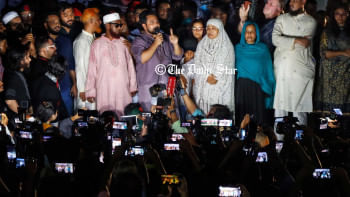If the police were all women
THE brutal attack of police on protesters in Dhaka city on May 10 has been condemned everywhere. These women and men who were demonstrating against sexual assault by a group of miscreants on April 14, near Dhaka University, had gathered to demand justice of the shameless abuse of women in a public place on Pahela Baishakh. In return what the protesters received from the police does not need to be described in words. Photographs published in the media tell it all – venom expressed through baton charges and indiscriminate beatings.
This happened in a country which has achieved impressive records of economic and social advancements during the last four decades. The incident happened in a country which receives accolades from the international community for making progress in improving school enrolment of girl children, for reducing maternal mortality and improving human development through addressing many gender related issues. It happened in a country where women contribute as much as men do to take forward the wheels of the economy through their hard work and by being engaged in all major sectors of the economy.
And above all, it happened in a country where the supreme power lies in the hand of a woman. Bangladesh is the only country in the world which has women prime ministers for more than two decades successively.
Is it uncommon to see brutality of the law enforcing agents on women while having a woman prime minister? I wish it was. But the role of the law enforcing department is not defined by gender, colour, group or caste of the ruler. That is why we also see situations when there are repetitive incidents of police torture on African American men in the US even after having an African American president. The role of the police is guided by the same principle in the case of both a female and a male head of state. The principle is based on class differences. Protesters, who were chased and grounded ferociously by police, do not belong to the ruling and powerful class, and thus face their wrath. The state wouldn't also do anything to punish the police for beating and stomping on protesters.
It is a regular sight to observe police using their power in mistreating common people, women and also opposition party members. We have seen in the past how police treated some of the political leaders who are ministers of the present government. With the change of power, the police also change their approach towards the opposition party dramatically.
However, for the common citizens, the stance of the law enforcing agency does not change with the change of the regime. The powerless continues to suffer the rage of the cops rightly and wrongly. But the force remains above the law even when they strike peaceful protesters who are not a threat to them. Because they are powered not only with guns and boots, but also protected by the state machinery.
Regrettably, we don't see the use of such power and strength of police when women are assaulted in front of their eyes. Instead they remain silent and inactive during almost all such incidents. Moreover, there is always an attempt to deny and underplay the situation which encourages the criminals to repeat such dreadful acts.
Would the behaviour of the police toward protesters have been different if they were all women police? Would the police take any action against those who had humiliated women if the police department was headed by a woman and all members were women? Unfortunately, not. As stated above, it doesn't matter if the head of the police force or the state is a woman or a man, what matters is how powerful one is.
But in a civilised society the police should be viewed as protectors, not attackers; supporters of good and opponents of evil. True, over the years the role of our police department has been shaped by political factors to a large extent. But we also have several examples of the heroic roles our police force plays. Many members of the law enforcing agency have risked their lives to save people and to establish law and order in the country. Unfortunately, bad examples outweigh the good ones.
Education, training and sensitisation are important in order to change the mindset of the police toward crimes against women. But these cannot work in isolation without the system of accountability. The culture of impunity gives them the nod to carry on with what they please to do. Also, it should be recognised that the police face new challenges and crises every day which increases their responsibility. In tackling these challenges, the law enforcing department needs to be strengthened. Development partners have undertaken police reform programmes. The government has to allocate more resources for increasing the people-police ratio and the salary of the cops, given the nature of their job. Ultimately, the onus rests on the government since the acts of the cops speak about the governance and state of the rule of law in the country. And we don't want to be known as a country that doesn't know how to establish good governance.
The writer is Research Director at CPD, currently a Visiting Scholar at the Earth Institute, Columbia University, New York.

 For all latest news, follow The Daily Star's Google News channel.
For all latest news, follow The Daily Star's Google News channel. 



Comments